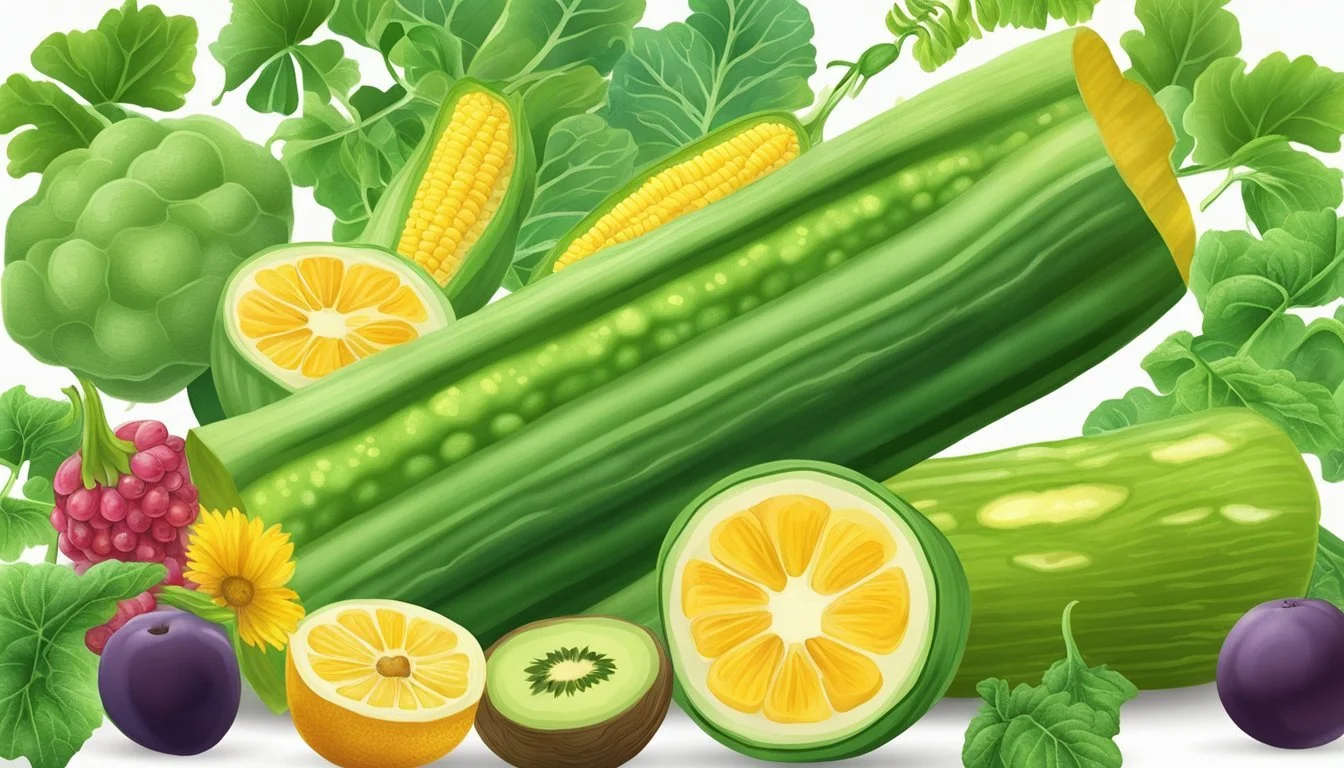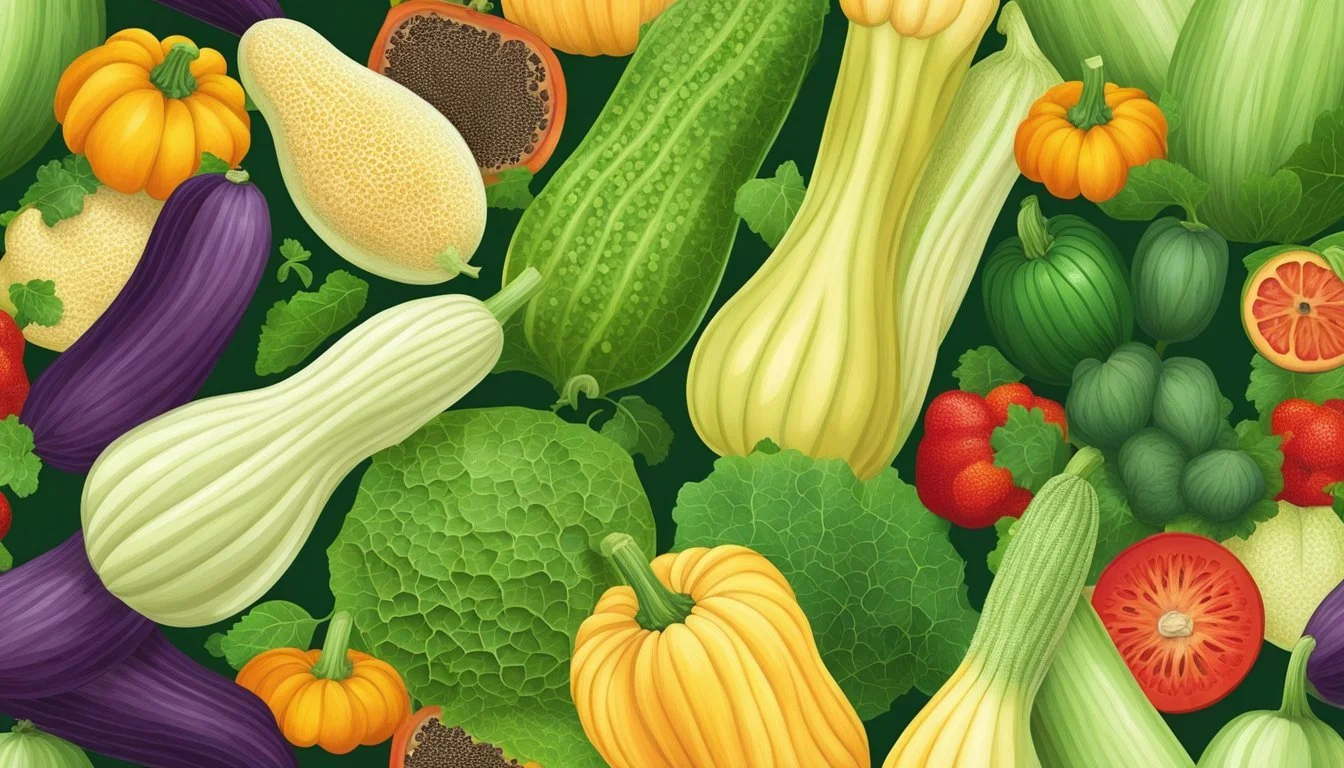What are the Health Benefits of Luffa?
Unveiling Nutritional Advantages
Luffa, known by various names such as sponge gourd, ridge gourd, or by its scientific monikers Luffa aegyptiaca and Luffa cylindrica, is a vegetable celebrated for its range of health benefits. Grown in tropical and subtropical regions, this gourd belongs to the cucurbitaceous family and comes in two well-known varieties: angled luffa and smooth luffa. Aside from its culinary use, particularly in Asian cuisines, luffa has been traditionally utilized for its medicinal properties.
The health benefits of luffa are expansive, encompassing both nutritional and medicinal values. It is notable for being low in calories while offering a rich blend of nutrients, including dietary fiber, vitamins—especially vitamin A in the form of beta-carotene—and a host of minerals. These nutrients contribute to its potential health impacts, which include blood sugar regulation, support for the immune system, and aid in digestion thanks to its fibrous content.
Additionally, the antioxidant properties of luffa may play a role in fighting oxidative stress and reducing inflammation, having positive implications for skin health and overall wellness. The utility of the plant extends beyond the fruit itself, as even the dried fibrous skeleton is employed as a natural scrubbing tool. Thus, the luffa plant serves as an exemplar of a natural resource providing an array of benefits for human health.
Nutritional Profile
Luffa, also known as ridge gourd, contains a wide array of nutrients that contribute to its health benefits. This section explores the vitamins, minerals, dietary fiber, and proteins found in luffa.
Vitamins and Minerals
Luffa is a rich source of vitamins and minerals essential for the body's overall functioning.
Vitamins: Luffa includes a significant amount of Vitamin C, known for its immune-boosting properties, and Vitamin A, which is crucial for maintaining good vision, skin health, and mucosal integrity. The Vitamin A content in 100 grams of fresh luffa is about 410 IU. Additionally, it contains B-complex vitamins such as thiamin (B1), riboflavin (B2), niacin (B3), and folate which are critical for energy metabolism and the nervous system.
Minerals: It is a source of essential minerals like potassium, important for maintaining electrolyte balance and heart health. Other minerals include magnesium, which aids in muscle and nerve function, calcium for bone health, iron which is essential for blood formation, zinc involved in immune function and healing, and manganese which plays a role in bone formation and metabolism. Sodium content is also present but generally in lower amounts.
Dietary Fiber and Proteins
Luffa is a good source of dietary fiber, which aids in digestion and contributes to a feeling of fullness. Fiber can also help to manage blood sugar levels and maintain bowel health.
Dietary Fiber: The dietary fiber in luffa helps to prevent constipation, making it a beneficial addition to the diet for digestive health.
Proteins: While not high in protein content, luffa does provide some protein, which is vital for building and repairing tissues and the production of enzymes and hormones.
By incorporating luffa into one's diet, they can benefit from its diverse nutritional profile, contributing to overall health and well-being.
Health Benefits
Luffa, also known as sponge gourd, is a vegetable that delivers multiple health benefits due to its nutritional components. These include aiding cardiovascular and glycemic health, supporting the digestive system, and offering anti-inflammatory benefits coupled with skin care properties.
Cardiovascular and Glycemic Health
Luffa is known to have a positive impact on cardiovascular health. It contains nutrients that can help manage cholesterol levels, promoting heart health. Furthermore, it may assist with glycemic control, making it beneficial for individuals with diabetes. The vegetable's ability to lower blood sugar and improve glucose tolerance is especially valuable for maintaining balanced sugar levels and preventing hyperglycemia.
Digestive System Support
For those seeking to enhance their digestion, luffa can be a valuable addition to their diet. Its high fiber content contributes to smooth bowel movements and aids in preventing constipation. Consequently, regular consumption of luffa supports overall gut health, helping to maintain an efficient and issue-free digestive process.
Anti-inflammatory and Skin Care
Luffa provides anti-inflammatory properties that can benefit the body in various ways. It contains antioxidants that fight free radicals, reducing oxidative stress which may lead to anti-inflammatory effects. Regarding skin care, the fibrous texture of dried luffa makes it a useful exfoliant that can help maintain healthy skin. In addition, the nutritional composition of luffa contributes to the maintenance of good vision and may help in slowing down the progression of conditions like macular degeneration by combatting the harmful impact of toxins on the eyes.
Luffa in Diet and Cooking
Luffa, often utilized in Asian cuisine, is a versatile vegetable that can enhance the nutritional value of meals without increasing calorie count significantly.
Incorporating Luffa into Meals
When incorporating luffa into meals, it is commonly used as an addition to soups, salads, and stir-fried dishes (What wine goes well with stir-fried dishes?) due to its mild flavor and sponge-like texture that absorbs seasonings well. It's an excellent source of vitamins, particularly vitamin C, and its fibrous texture lends well to a variety of dishes:
Soups: Young luffa gourds add a subtle flavor and are typically sliced thinly for use in clear broths or more substantial soups.
Salads: Fresh luffa can be shredded and added to salads, providing a crunchy texture and light taste.
Stir-fried Dishes: Luffa can be sliced and stir-fried with other vegetables, meats, or tofu, absorbing the flavors of sauces and seasonings used in cooking.
Preparation Tips:
Peel off the outer skin before cooking.
Remove seeds from mature luffa as they can be hard and unpleasant to eat.
Culinary Varieties
Within the culinary context, there are a few common varieties of luffa to consider:
Angled Luffa: Also known as ridged gourd, is often found in Asian cuisine used primarily in stir-fries and curries.
Smooth Luffa: It is akin to zucchini in its usability and is an excellent addition to both Asian and fusion dishes.
Both these types are high in dietary fiber and low in carbohydrates, making them suitable for those who look to add vegetables to their diet without significantly increasing their carbohydrate intake. They are commonly grown in warm climates and are most tender and flavorful when harvested young.
Safety and Considerations
When considering the consumption of luffa, it is important to understand its safety profile and the potential for side effects. Special populations such as pregnant and breastfeeding women should be particularly cautious about using luffa, and attention should be given to appropriate dosages.
Possible Side Effects
Luffa is generally considered safe for most people when consumed in food amounts. However, when taken medicinally, one should be aware that luffa may cause side effects such as:
Allergies: Although rare, an allergic reaction to luffa is possible.
Digestive issues: High doses may lead to gastrointestinal discomfort.
Patients should monitor for any adverse reactions and seek medical advice if they experience any concerning symptoms.
Special Populations
Certain groups of people need to exercise more caution with luffa use, particularly in medicinal forms:
Pregnant women: There is insufficient reliable information about the safety of taking luffa if you are pregnant. Therefore, it is advisable to avoid use.
Breastfeeding women: Similarly, not enough is known about the safety of luffa during breastfeeding. It is best to stay on the safe side and avoid use.
Dosage considerations: There is currently no established safe or effective dose of luffa for medicinal use. One should consult with a healthcare provider before using luffa for health benefits.
Due to the lack of extensive research on the safety of medicinal amounts of luffa for these special populations, they should adhere to food quantities or avoid usage altogether.
Frequently Asked Questions
Luffa is known for its various health benefits, particularly relating to skin health, digestion, and potential in managing certain conditions. Below are specific questions and answers to understand the health benefits of luffa.
How does luffa support skin health?
Luffa, when used topically as an exfoliating sponge, helps remove dead skin cells, which promotes clearer skin and can improve skin texture. Its fibrous texture aids in exfoliation, contributing to a healthier-looking complexion.
Can consuming luffa improve hair condition?
While there is no direct evidence linking luffa consumption to improved hair condition, it contains essential nutrients that could contribute to overall health, which in turn can positively affect hair quality.
What are the potential side effects of consuming luffa?
Consuming immature luffa fruits (What wine goes well with fruits?) may lead to toxicity, resulting in symptoms like vomiting and diarrhea. It is essential to consume only the ripe vegetable to avoid any adverse effects.
How does luffa intake impact blood pressure levels?
The potassium content in luffa can help regulate blood pressure levels by countering the effects of sodium and assisting in vasodilation.
Are there health benefits associated with sponge leaf consumption?
There is limited information available on the health benefits of sponge leaf consumption as most of the research focuses on the fibrous fruit of the luffa plant.
Does luffa consumption benefit diabetic individuals?
Luffa contains dietary fiber, which slows down glucose absorption and could potentially help in maintaining stable blood sugar levels, beneficial for individuals managing diabetes.





